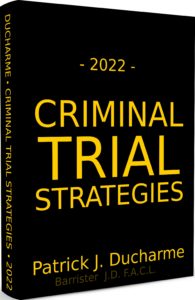Pursuant to section 650 of the Code the accused has the right and duty to attend at all times and for all aspects of his trial. In certain limited circumstances the court may interfere with the right of the accused to be present. Subsection 650(2) allows the court to exclude an accused from any proceeding against his or her will in the limited circumstances where the court causes the accused to be removed and to be kept out of the court because the accused is interrupting the proceedings, or, if the accused is unfit to stand trial and the court is satisfied that failure to do so might have an adverse effect on the mental condition of the accused. Also, the court may permit the accused to be out of court during the whole or any part of his trial on such conditions as the court considers proper. “Present” means physically present and able to hear and see the proceedings.
A meeting in a Judge’s chamber is a common occurrence at several stages of the criminal trial process. However, private meetings in chambers during the trial itself may prove problematic in the sense that discussing various aspects of the case in the absence of the accused may infringe the rights of the accused pursuant to section 650 of the Code. For example, the Ontario Court of Appeal ordered a new trial after it concluded that the accused’s right to be present during the mid-trial conference had been violated. In R. v. Schofield2 the court found that the trial Judge had inappropriately offered an opinion on the weaknesses in the Crown’s case and also the weaknesses in the testimony of the accused. The court also found that the negative comments about the testimony of the accused seriously compromise the trial Judge’s impartiality. The court found that this was particularly the case because it was a Judge alone trial rather than a jury trial. The court concluded that the accused should have been present during the mid-trial conference because aspects of his case were being discussed and just in his absence contrary to section 650 of the Code.
Subsection 650.01 (1) of the Code also provides that in proceedings dealing with indictable offences an accused may appoint counsel to represent the accused for any proceedings under the Code by filing a “Designation” with the court. The Designation permits the accused to appear by the designated counsel without being present for any part of the proceedings other than a part during which oral evidence of the witnesses is taken, or during which jurors are being selected or during an application for habeas corpus.
The above is the an excerpt of Patrick J Ducharme’s book, Criminal Trial Strategies, available at Amazon or in bulk through MedicaLegal Publishing.
Read or listen to the Preface and Introduction and subscribe to Patrick Ducharme’s Youtube Channel.

